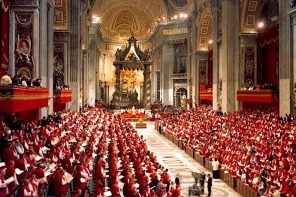As a Jewish scholar of early Christianity and a student of Raymond E. Brown—one of the 20th Century’s most prominent Catholic scholars of the New Testament—I took special note of the Vatican’s announcement about the new language for the prayer of the conversion of the Jews.
The Tridentine Mass, which is the old Latin Mass revived by Pope Benedict XVI last year, traditionally contains a prayer on Good Friday for the conversion of the Jews. In response to Jewish groups who had protested the prayer, the Pope issued a modification of the prayer. The primary changes include removing the reference to the “blindness of the Jews” as well as the appeal to “remove the veil from their hearts.”
According to the New York Times, the new prayer may be translated as follows: “Let us pray for the Jews. May the Lord Our God enlighten their hearts so that they may acknowledge Jesus Christ, the savior of all men.” The prayer also expresses hope that “all Israel may be saved.”
What many may not realize is that both the old and the new Good Friday prayers are citing the apostle Paul. The reference to removing the veil comes from 2 Corinthians 3:13 while the reference to all Israel being saved comes from Romans 11:26. Although the former text has never been seen positively in Jewish-Christian relations, the latter text sometimes has.
Some modern scholars have argued that Paul’s claim that “all Israel will be saved” means that all Jews will be saved as Jews, not that all Jews will convert to Christ and, as a result of that, be saved. At stake is the question, Who is Israel? If Israel refers to Jews who believe in Jesus, then conversion would seem to be required for salvation. If Israel simply refers to Jews, then Paul’s claim that “all Israel will be saved” means simply that all Jews are saved—without any further qualification.
There are numerous reasons why we should interpret Paul’s use of the term as a simple reference to the Jewish people. First, it’s the ordinary meaning in Paul’s day and there is no indication that Paul is using the term in some new-fangled way. Nowhere else in his letters does Paul indicate any narrowing of the label “Israel” to refer exclusively to Jews who believe in Jesus. Second, in Romans 11:25 Paul speaks of the “full number of Gentiles” followed by the mention of “all Israel” in 11:26. Just as Paul contrasts Jews and Gentiles throughout his letter to the Romans, the juxtaposition of “Gentiles” and “Israel” here seems to be the equivalent. Third, even if we grant that Paul might be arguing for a narrowing of the term (which I don’t think is the case), the fact that he says “all Israel” implies that he uses the term here broadly to refer to the Jewish people as a whole, which at the very least would seem to include Jews who believe in Jesus and Jews who don’t.
If this interpretation of “all Israel will be saved” is correct, then the use of this phrase in the old Latin Good Friday mass constitutes a misuse of Romans 11:26 in particular and Paul’s theology of salvation in general. According to Paul, there is no need to pray for the conversion of the Jews. If only the Pope were more up to date on biblical scholarship!
As a Jew committed to the ongoing work of Jewish-Christian Relations and as a scholar of the New Testament, I find the Latin Good Friday prayer a step backward. Fortunately, the original title of the prayer has not been restored. For centuries it was known as the “Prayer for the Conversion of the Perfidious Jews.
But, it is important to remember that most Catholics will not pray for the conversion of the Jews on Good Friday this year. Most Catholics, those who follow the language of Vatican II and say the liturgy in vernacular languages, will recite the following prayer instead: “Let us pray for the Jewish People, the first to hear the word of God, that they may continue to grow in the love of His Name and in faithfulness to His Covenant.” Listen to your Church as we pray that the people you first made your own may arrive at the fullness of redemption.”




